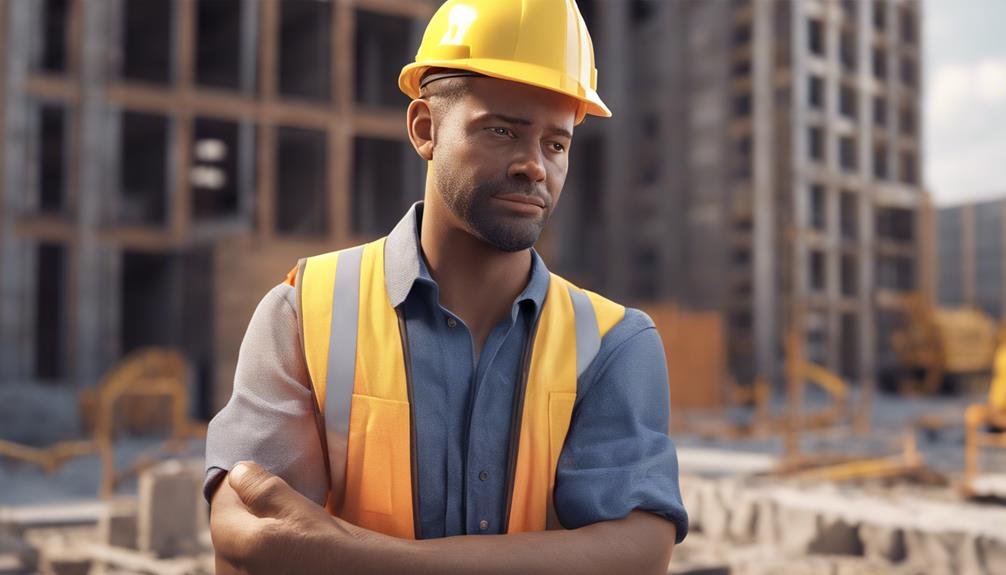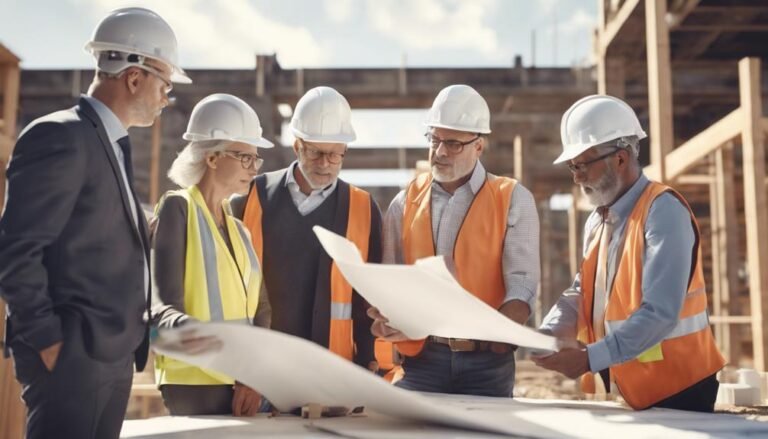The Importance of Emotional Intelligence in Construction
Enhancing emotional intelligence in construction is vital for building strong teamwork, resolving conflicts efficiently, and ensuring project success by boosting communication and leadership skills. Recognizing emotions and fostering empathy will improve collaboration, while mastering conflict resolution techniques creates a positive work atmosphere. Effective communication, active listening, and emotional awareness play key roles in enhancing relationships and workflow efficiency. Developing emotional intelligence in construction settings leads to better client relations and empowers leadership development. By prioritizing emotional intelligence, you can greatly impact the outcome of construction projects and cultivate a harmonious work environment.
Key Takeaways
- Enhances team collaboration for improved project efficiency.
- Develops conflict resolution skills crucial for harmonious construction environments.
- Manages stress effectively to ensure productivity and well-being.
- Nurtures positive client relations through empathy and understanding.
- Fosters leadership development by promoting communication and teamwork.
Understanding Emotional Intelligence
Understanding emotional intelligence is essential for maneuvering through complex interpersonal dynamics in the construction industry. Self-awareness development and empathy building are critical components of emotional intelligence. Self-awareness involves recognizing your own emotions, strengths, weaknesses, and the impact they have on others. By understanding these aspects, you can better navigate interactions with colleagues, clients, and stakeholders.
Empathy building goes hand in hand with self-awareness, as it allows you to recognize and understand the emotions of others, fostering better communication and collaboration.
Emotional regulation techniques and social awareness enhancement are also important in the construction sector. Emotional regulation involves managing your emotions effectively, particularly in high-pressure situations common on construction sites. By regulating your emotions, you can make rational decisions and maintain positive relationships.
Social awareness enhancement entails being attuned to the emotions and needs of those around you. This skill is invaluable for fostering teamwork, resolving conflicts, and building strong working relationships in the construction industry.
Impact on Project Success
Exploring the domain of emotional intelligence in construction can directly impact the success of your projects, particularly in how you manage interpersonal dynamics and navigate high-pressure situations on-site. Emotional intelligence plays a critical role in enhancing team collaboration, which in turn influences project outcomes positively. By understanding and regulating your emotions effectively, you can foster a more cohesive and productive work environment, leading to improved project efficiency.
| Emotional Intelligence Impact on Project Success | |
|---|---|
| Enhanced Team Collaboration | Positive Project Outcomes |
| Emotional intelligence helps in building strong relationships within your team, fostering effective communication, trust, and mutual respect. | By promoting a harmonious work environment, project outcomes are more likely to meet or exceed expectations, leading to overall success. |
| Effective Conflict Resolution | Improved Decision-Making |
| Emotional intelligence equips you with the skills to address conflicts constructively, minimizing disruptions and maintaining project momentum. | Enhanced emotional intelligence enables better judgment and problem-solving abilities, resulting in more informed and strategic decisions. |
Benefits for Team Dynamics
Enhancing emotional intelligence in construction can greatly benefit team dynamics by improving communication skills and fostering enhanced conflict resolution.
When team members are more attuned to their emotions and those of their colleagues, they can communicate more effectively, leading to smoother collaborations.
Additionally, the ability to navigate and resolve conflicts with emotional intelligence can prevent misunderstandings and promote a more cohesive working environment.
Improved Communication Skills
Developing strong communication skills within a construction team is essential for fostering collaboration and achieving project success. Active listening and conflict resolution are crucial components in enhancing communication effectiveness. By actively listening to your team members, you demonstrate respect and understanding, which can lead to improved relationships and smoother workflows. Additionally, being aware of nonverbal cues and having emotional awareness can help you interpret underlying emotions and sentiments, enabling you to respond appropriately and build trust within the team.
| Communication Skills | Benefits for Team Dynamics |
|---|---|
| Active Listening | Demonstrates respect and understanding. |
| Conflict Resolution | Leads to improved relationships and smoother workflows. |
| Nonverbal Cues | Helps interpret underlying emotions. |
| Emotional Awareness | Enables appropriate responses and builds trust. |
Enhanced Conflict Resolution
To optimize team dynamics in construction projects, honing enhanced conflict resolution skills is imperative for fostering a harmonious and productive work environment. Conflict resolution techniques rooted in emotional intelligence play a pivotal role in maneuvering disputes effectively.
By developing emotional awareness, team members can better understand their own emotions and those of their colleagues, leading to improved conflict management. Encouraging open communication and active listening can help prevent conflicts from escalating.
Implementing strategies such as collaborative problem-solving and negotiation can aid in resolving disagreements efficiently. Addressing conflicts promptly and constructively fosters a positive team environment, enhancing overall productivity and cohesion.
Embracing emotional intelligence in conflict resolution not only resolves issues but also strengthens relationships within the construction team.
Communication and Conflict Resolution
Effective communication is a cornerstone of successful conflict resolution in the construction industry. Active listening plays an essential role in understanding different perspectives and fostering collaboration among team members. By actively listening to the concerns and viewpoints of others, conflicts can be addressed more effectively, leading to better outcomes on construction projects.
In addition to active listening, mediation techniques are pivotal in resolving disputes within construction teams. Mediation involves a neutral third party facilitating discussions between conflicting parties to help them reach a mutually acceptable solution. This process can help prevent conflicts from escalating and maintain a positive working environment on construction sites.
Practicing effective communication and utilizing mediation techniques can greatly improve conflict resolution in construction. By promoting open dialogue, encouraging active listening, and implementing mediation strategies, construction professionals can navigate disagreements more constructively, ultimately enhancing project outcomes and fostering stronger team dynamics.
Leadership Development
In the field of construction, developing strong leadership skills is essential for driving project success and fostering team cohesion. Leadership qualities play an important role in guiding construction teams towards achieving goals efficiently. Effective leaders in construction possess traits such as clear communication, decisiveness, and the ability to inspire and motivate team members.
To excel in leadership roles within construction projects, individuals must prioritize team collaboration. Encouraging open communication among team members, delegating tasks effectively, and promoting a positive work environment are all key aspects of successful leadership in construction. Leaders who actively involve their team members in decision-making processes tend to foster a sense of ownership and commitment among the team.
Moreover, embracing diversity within the team and recognizing the unique strengths of each member can greatly enhance team collaboration. Strong leaders understand the importance of building trust and fostering a culture of mutual respect and support. By cultivating these leadership qualities and promoting team collaboration, construction projects can achieve higher levels of efficiency and success.
Enhancing Decision-Making
Strengthen your construction project outcomes by honing your ability to make informed and timely decisions. Decision-making strategies play an important role in the construction industry. By enhancing your emotional awareness and cognitive biases, you can improve your decision-making process and positively impact project success.
To enhance decision-making, start by recognizing the influence of emotions on your choices. Emotional intelligence allows you to understand and manage your emotions effectively, leading to more rational decision-making. Additionally, being aware of cognitive biases such as confirmation bias or anchoring can help you make more objective decisions.
Implementing structured decision-making processes can also aid in enhancing your choices. By using methods like cost-benefit analysis, risk assessment, or SWOT analysis, you can evaluate options thoroughly and make decisions based on data rather than emotions.
Stress Management in Construction
Managing stress in construction requires a proactive approach to identifying and addressing sources of pressure that can impact project performance and overall well-being. To effectively navigate the demanding environment of construction projects, consider implementing the following strategies:
- Stress Reduction Techniques:
- Incorporate mindfulness practices into your daily routine to stay present and focused amidst challenges.
- Take short breaks throughout the day to recharge and prevent burnout.
- Delegate tasks when possible to lighten your workload and reduce stress levels.
- Mental Health Support:
- Develop coping strategies such as deep breathing exercises or physical activities to manage stress effectively.
- Seek professional help or counseling if stress becomes overwhelming or begins to affect your mental well-being.
- Foster open communication with colleagues to create a supportive work environment.
- Work-Life Balance:
- Establish boundaries between work and personal life to prevent work-related stress from spilling over into your home life.
- Engage in hobbies or activities outside of work to relax and recharge.
- Prioritize self-care practices such as exercise, adequate sleep, and healthy eating habits to support your overall well-being.
Empathy in Construction Settings
You must understand the diverse needs of clients to tailor construction projects effectively. Building trust with stakeholders through empathetic communication is essential for successful project outcomes.
Resolving conflicts with empathy and understanding can lead to smoother construction processes and improved relationships within the industry.
Understanding Client Needs
Understanding client needs in construction settings involves actively listening to their concerns and expectations to guarantee successful project outcomes. To secure client satisfaction and timely project delivery, follow these steps:
- Conduct thorough initial meetings: Gather detailed information about the client's vision, goals, and requirements.
- Regular communication: Maintain open lines of communication throughout the project to address any changes or concerns promptly.
- Provide regular updates: Keep the client informed about project progress, milestones, and any potential delays to manage expectations effectively.
Building Trust With Stakeholders
To foster strong relationships and guarantee project success in construction settings, demonstrating empathy towards stakeholders is essential. Stakeholder engagement is enhanced when you actively listen to their concerns, understand their perspectives, and respond with sensitivity.
Building trust with stakeholders involves consistent communication, transparency, and a genuine interest in their needs. By showing empathy, you create a supportive environment that encourages open dialogue and collaboration. This approach not only strengthens client relationships but also contributes to credibility building within the construction industry.
Resolving Conflicts Effectively
In construction settings, effective conflict resolution requires the application of empathy as a fundamental tool for fostering understanding and cooperation among stakeholders.
To resolve conflicts effectively, consider the following:
- Active Listening: Take the time to truly listen to all parties involved in the conflict. This shows that you value their perspective and are willing to understand their point of view.
- Problem-Solving Techniques: Utilize problem-solving techniques to address the root cause of the conflict rather than just the surface issues. This approach can lead to more sustainable solutions.
- Emotional Intelligence: Being aware of your own emotions and those of others can help in managing conflicts with empathy and understanding, creating a more harmonious working environment.
Emotional Intelligence Training
Implementing emotional intelligence training programs has shown substantial benefits in enhancing team cohesion and communication within the construction industry. By incorporating emotional intelligence techniques and EI training modules into your workforce development strategy, you can equip your team with the necessary skills to navigate challenging situations effectively. These training programs focus on self-awareness, self-regulation, empathy, and effective communication, all of which are essential for fostering a positive work environment.
Through emotional intelligence training, employees learn how to recognize and manage their emotions, leading to improved conflict resolution, enhanced stress management, and better decision-making processes. By understanding their emotions and the emotions of others, construction professionals can build stronger relationships with colleagues, clients, and stakeholders, ultimately contributing to project success.
Moreover, emotional intelligence training can help individuals become more resilient in the face of adversity, allowing them to adapt to changing circumstances and maintain a high level of performance. Investing in EI training isn't only beneficial for individual growth but also for the overall productivity and success of construction projects.
Creating a Positive Work Environment
Boosting team morale through positive reinforcement and recognition can have a profound impact on productivity and job satisfaction.
Implementing effective conflict resolution strategies guarantees that issues are addressed promptly, fostering a harmonious work environment.
Open and clear communication among team members promotes camaraderie and strengthens relationships, creating a positive and cohesive workplace culture.
Team Morale Boosts
Consider fostering a culture of appreciation and recognition to enhance team morale and promote a positive work environment in construction projects. Here are some practical ways to boost team morale:
- Celebrate Achievements: Acknowledge and celebrate milestones, both big and small, to show appreciation for the team's hard work.
- Open Communication: Encourage open dialogue where team members can share ideas, concerns, and feedback freely.
- Professional Development Opportunities: Provide opportunities for skill-building and career growth to show investment in the team's future.
Conflict Resolution Strategies
To foster a positive work environment in construction projects, it's essential to establish effective conflict resolution strategies that promote open communication and collaboration among team members. Active listening plays an important role in resolving conflicts promptly and effectively. By actively listening to all parties involved, you can gain a better understanding of the underlying issues and perspectives, which is key to finding mutually beneficial solutions.
Problem-solving skills are also essential in conflict resolution. Encouraging team members to work together to identify the root causes of conflicts and brainstorm possible solutions fosters a sense of ownership and cooperation. By implementing these strategies consistently, you can create a harmonious work environment where conflicts are addressed constructively, leading to improved productivity and morale.
Communication Fosters Camaraderie
Effective communication among team members is pivotal for fostering camaraderie and creating a positive work environment in construction projects. Improving relationships and fostering teamwork through communication can lead to increased productivity and job satisfaction.
Here's how you can achieve this:
- Clear Expectations: Communicate clearly about project goals, roles, and responsibilities to avoid misunderstandings.
- Active Listening: Encourage listening to understand, not just to respond, which can help build trust and empathy among team members.
- Constructive Feedback: Provide feedback in a respectful and constructive manner to promote continuous improvement and a culture of learning within the team.
Conclusion
To sum up, emotional intelligence plays a vital role in the success of construction projects. Did you know that teams with high emotional intelligence are 20% more likely to complete projects on time and within budget?
By focusing on empathy, communication, and leadership development, construction professionals can create a positive work environment that fosters collaboration and productivity.
Prioritizing emotional intelligence in construction can lead to improved project outcomes and stronger team dynamics.







